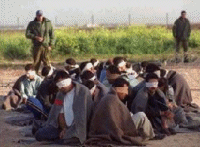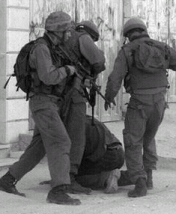

Political Prisoners
Palestinian Prisoners in Israeli Detention
|
|
Since the beginning of the Israeli occupation of Palestinian territories in 1967, over 650,000 Palestinians have been detained by Israel. This forms approximately 20% of the total Palestinian population in the Occupied Palestinian Territories (OPT). As the majority of those detained are male, the number of Palestinians detained forms approximately 40% of the total male Palestinian population in the OPT.
The arrest and detention of Palestinians living within the OPT is governed by a wide-ranging set of military regulations that govern every aspect of Palestinian civilian life. There are approximately 1,500 military regulations governing the West Bank and over 1,400 governing the Gaza Strip. The Israeli military commander of the region issues military orders, and the issuance of new orders often remains unknown and only become apparent when they are implemented, as the military commander may issue new military regulations at any moment.
Palestinians are tried within Israeli military courts located within Israeli military centers in the OPT. These military tribunals are presided over by a panel of three judges appointed by the military, two of whom often do not have any legal training or background. These tribunals rarely fall within the required international standards of fair trial.
Prisons and Detention Camps
Israeli prisons and military detention camps are primarily located within the 1948 borders of Israel. Palestinians from the OPT can be held in Israel in:
- 5 interrogation centers;
- 7 detention/holding centers;
- 3 military detention camps;
- 9 prisons
The location of prisons within Israel and the transfer of detainees to locations within the occupying power’s territory are illegal under international law and constitute a war crime. The Fourth Geneva Convention explicitly states that “Protected persons accused of offences shall be detained in the occupied country, and if convicted they shall serve their sentences therein” (Article 47). There are only two military detention centers and one military detention camp located within the OPT.
As a result of an arbitrary permit system which governs Palestinians movement within the Occupied Palestinian Territories, including East Jerusalem, and to and from the 1948 borders of Israel, family visits to detainees are often not possible, extremely infrequent, or impossible. Since the beginning of the current Intifada in September 2000, family visits have been prevented as virtually no permits have been issued to families from the West Bank and the Gaza Strip.
Under Israeli military regulations, a Palestinian can be detained for up to 12 days without the Israeli military informing the detainee of the reason for his/her arrest and without being brought before a judge. Between April and June 2002, this period of time was increased to 18 days by Israeli Military Order 1500. Following or during the 12 days of detention, a detainee is sent to an interrogation center, charged with an offense, given an administrative detention order, or released.
Interrogation and Torture
|
|
A Palestinian detainee can be interrogated for a total period of 180 days, during which he/she can also be denied lawyer visits for a period of 90 days. During the interrogation period, a detainee is often subjected to some form of torture ranging in extremity, whether physical or psychological. The use of practices that constitute torture during interrogation has been legalized within the Israeli judicial system and permitted in individual cases in which the GSS deems a detainee a threat to state security or a ‘ticking bomb’. In some instances, detainees have died while in custody as a result of torture. Confessions extracted through torture are admissible in Israeli court.
Administrative Detention
Administrative detention, which is arrest without charge or trial, has been used as a form of collective punishment by the Israeli military against Palestinians, and is illegal in this form under international law. During the period of March 2002 to October 2002, Israeli occupying forces arrested over 15,000 Palestinians during mass arrest campaigns, rounding up males in cities and villages between the ages of 15 to 45. In October 2002, there were over 1,050 Palestinians in administrative detention.
Administrative detention is indefinitely renewable under military regulations. A detainee may be given an administrative detention order for a period of between 1 – 6 months, after which the order may be renewed. Administrative detention is based on secret evidence brought forward during military tribunals, to which neither the detainee nor his/her lawyer have access to. One of the longest Palestinian administrative detainees remained in custody for over 8 years, without ever being charged.
Children
Under military regulations in force in the OPT, a child over the age of 16 is considered an adult, contrary to the defined age of a child as under 18 in the Convention of the Rights of the Child, to which Israel is a signatory. In practice, Palestinian children may be charged and sentenced in military courts beginning at the age of 12.
- Between the ages of 12-14, children can be sentenced for offences for a period of up to six months – meaning that a child accused of throwing a stone can be sent to prison for six months;
- After the age of 14, Palestinian children are tried as adults, in violation of international law;
- There are no juvenile courts and children are often held and serve their sentences in cells with criminal prisoners and are often not separated from adults, also in violation of international law.
Prison Conditions
Prison conditions in Israeli military detention camps are inhumane. Detainees are held in overcrowded prison tents that are often threadbare and do not provide for adequate shelter against extreme weather. Prisoners are not provided adequate food rations, neither in quantity nor quality, nor provided with clean clothes or adequate cleaning supplies. Many of the detainees currently being held in military detention camps were injured during their arrests and have not been provided the necessary medical attention, like those who suffer from chronic illnesses.
Access to Lawyers
Palestinian lawyers from the OPT are not permitted any special travel privileges in order to defend their clients. They are subjected to the same travel restrictions as all Palestinians in the OPT. Those lawyers who are able to access their clients have extremely high case loads and are often subjected to strip searches and humiliating treatment when visiting their clients.
| Multimedia |
| Additional Resources |
Amnesty International Report – IDF doctor says Dirani rape claim backed by evidence |
| Organizations |
| Stay Informed |
|
Sign up for our mailing list and receive an email whenever we post a new article on our news site, Israel-Palestine News. |
This website is printer-friendly. Please Print this article and share it with your friends and family.



